Environment Management: Waste Disposal & Biodiversity Loss Impact
VerifiedAdded on 2023/06/14
|6
|1409
|312
Essay
AI Summary
This essay examines the significant global environmental challenges of waste disposal and biodiversity loss, focusing on their impact on the hotel and tourism sectors. It highlights the increasing global waste crisis, particularly from plastics and nuclear waste, and its detrimental effects on the environment and public health. The essay also addresses the alarming rate of biodiversity loss due to human activities, emphasizing Australia's role in this issue. It discusses how these challenges affect the tourism industry, particularly accommodations and attraction managers, due to decreased tourist appeal. The essay further explores potential business responses, such as waste management initiatives, eco-labeling, and sustainable practices adopted by companies like Thomas Cook, to mitigate these environmental problems and promote sustainability within the hotel and tourism industry. The conclusion emphasizes the need for collaborative efforts to address these issues and create a more sustainable environment.
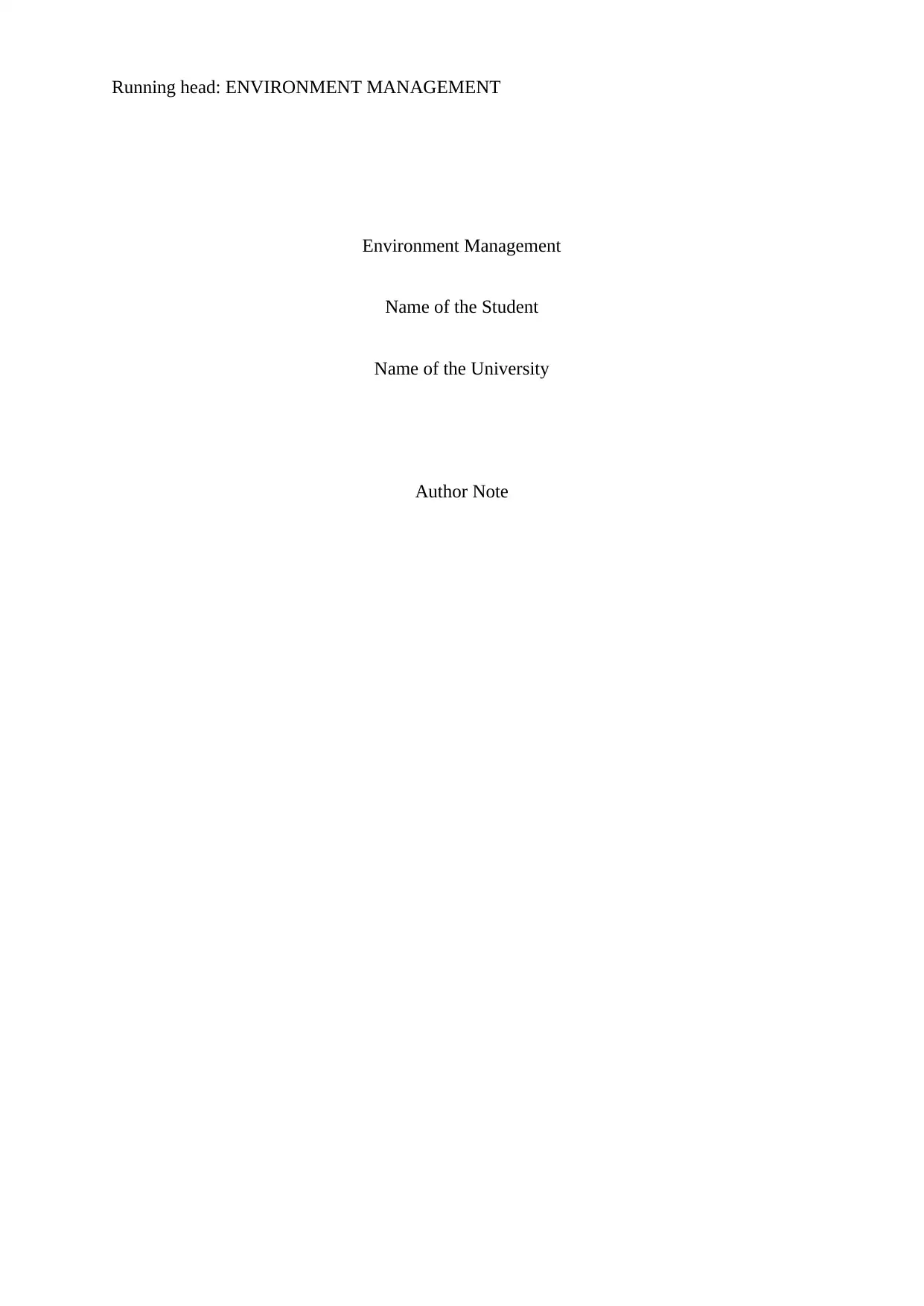
Running head: ENVIRONMENT MANAGEMENT
Environment Management
Name of the Student
Name of the University
Author Note
Environment Management
Name of the Student
Name of the University
Author Note
Paraphrase This Document
Need a fresh take? Get an instant paraphrase of this document with our AI Paraphraser
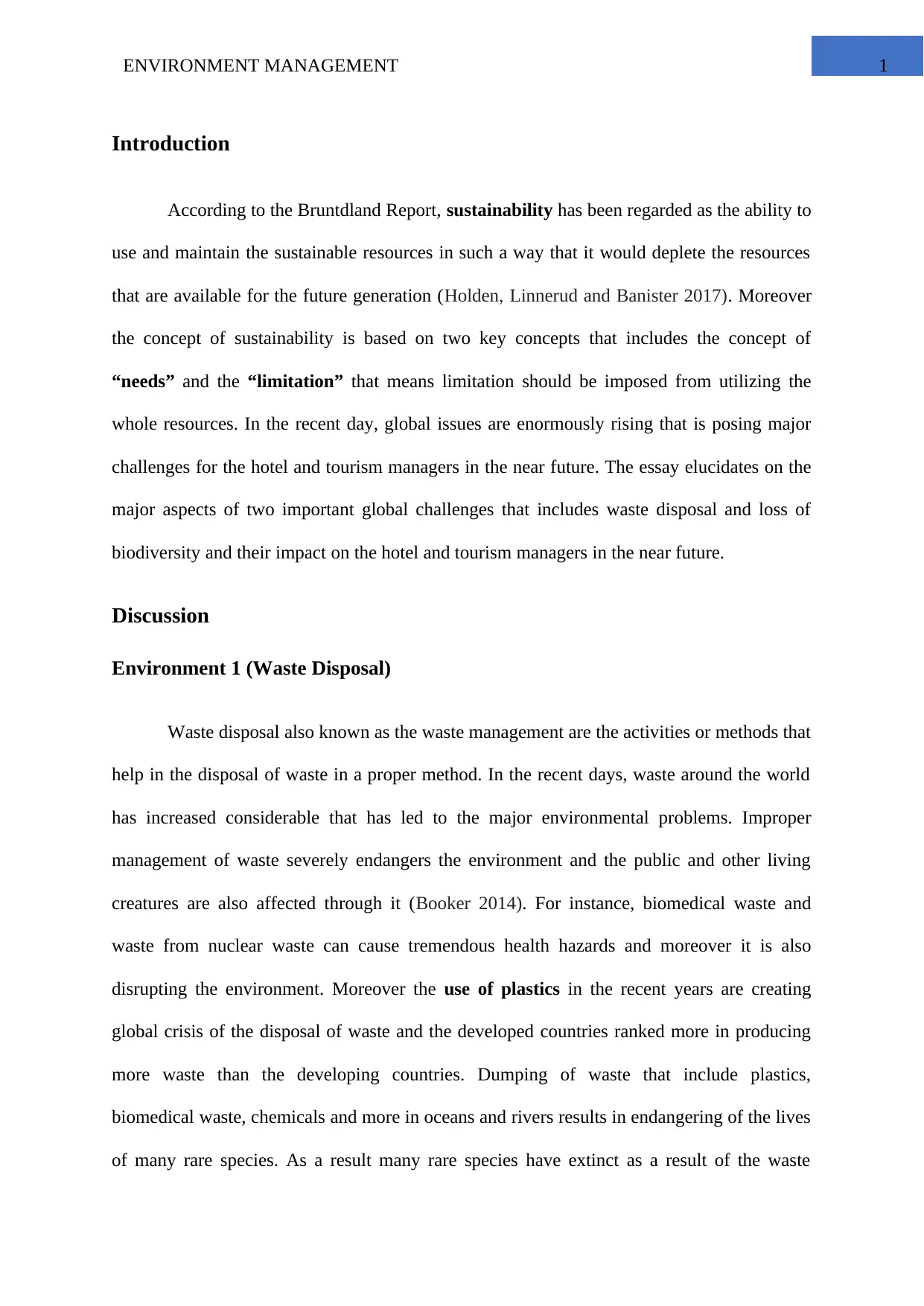
1ENVIRONMENT MANAGEMENT
Introduction
According to the Bruntdland Report, sustainability has been regarded as the ability to
use and maintain the sustainable resources in such a way that it would deplete the resources
that are available for the future generation (Holden, Linnerud and Banister 2017). Moreover
the concept of sustainability is based on two key concepts that includes the concept of
“needs” and the “limitation” that means limitation should be imposed from utilizing the
whole resources. In the recent day, global issues are enormously rising that is posing major
challenges for the hotel and tourism managers in the near future. The essay elucidates on the
major aspects of two important global challenges that includes waste disposal and loss of
biodiversity and their impact on the hotel and tourism managers in the near future.
Discussion
Environment 1 (Waste Disposal)
Waste disposal also known as the waste management are the activities or methods that
help in the disposal of waste in a proper method. In the recent days, waste around the world
has increased considerable that has led to the major environmental problems. Improper
management of waste severely endangers the environment and the public and other living
creatures are also affected through it (Booker 2014). For instance, biomedical waste and
waste from nuclear waste can cause tremendous health hazards and moreover it is also
disrupting the environment. Moreover the use of plastics in the recent years are creating
global crisis of the disposal of waste and the developed countries ranked more in producing
more waste than the developing countries. Dumping of waste that include plastics,
biomedical waste, chemicals and more in oceans and rivers results in endangering of the lives
of many rare species. As a result many rare species have extinct as a result of the waste
Introduction
According to the Bruntdland Report, sustainability has been regarded as the ability to
use and maintain the sustainable resources in such a way that it would deplete the resources
that are available for the future generation (Holden, Linnerud and Banister 2017). Moreover
the concept of sustainability is based on two key concepts that includes the concept of
“needs” and the “limitation” that means limitation should be imposed from utilizing the
whole resources. In the recent day, global issues are enormously rising that is posing major
challenges for the hotel and tourism managers in the near future. The essay elucidates on the
major aspects of two important global challenges that includes waste disposal and loss of
biodiversity and their impact on the hotel and tourism managers in the near future.
Discussion
Environment 1 (Waste Disposal)
Waste disposal also known as the waste management are the activities or methods that
help in the disposal of waste in a proper method. In the recent days, waste around the world
has increased considerable that has led to the major environmental problems. Improper
management of waste severely endangers the environment and the public and other living
creatures are also affected through it (Booker 2014). For instance, biomedical waste and
waste from nuclear waste can cause tremendous health hazards and moreover it is also
disrupting the environment. Moreover the use of plastics in the recent years are creating
global crisis of the disposal of waste and the developed countries ranked more in producing
more waste than the developing countries. Dumping of waste that include plastics,
biomedical waste, chemicals and more in oceans and rivers results in endangering of the lives
of many rare species. As a result many rare species have extinct as a result of the waste
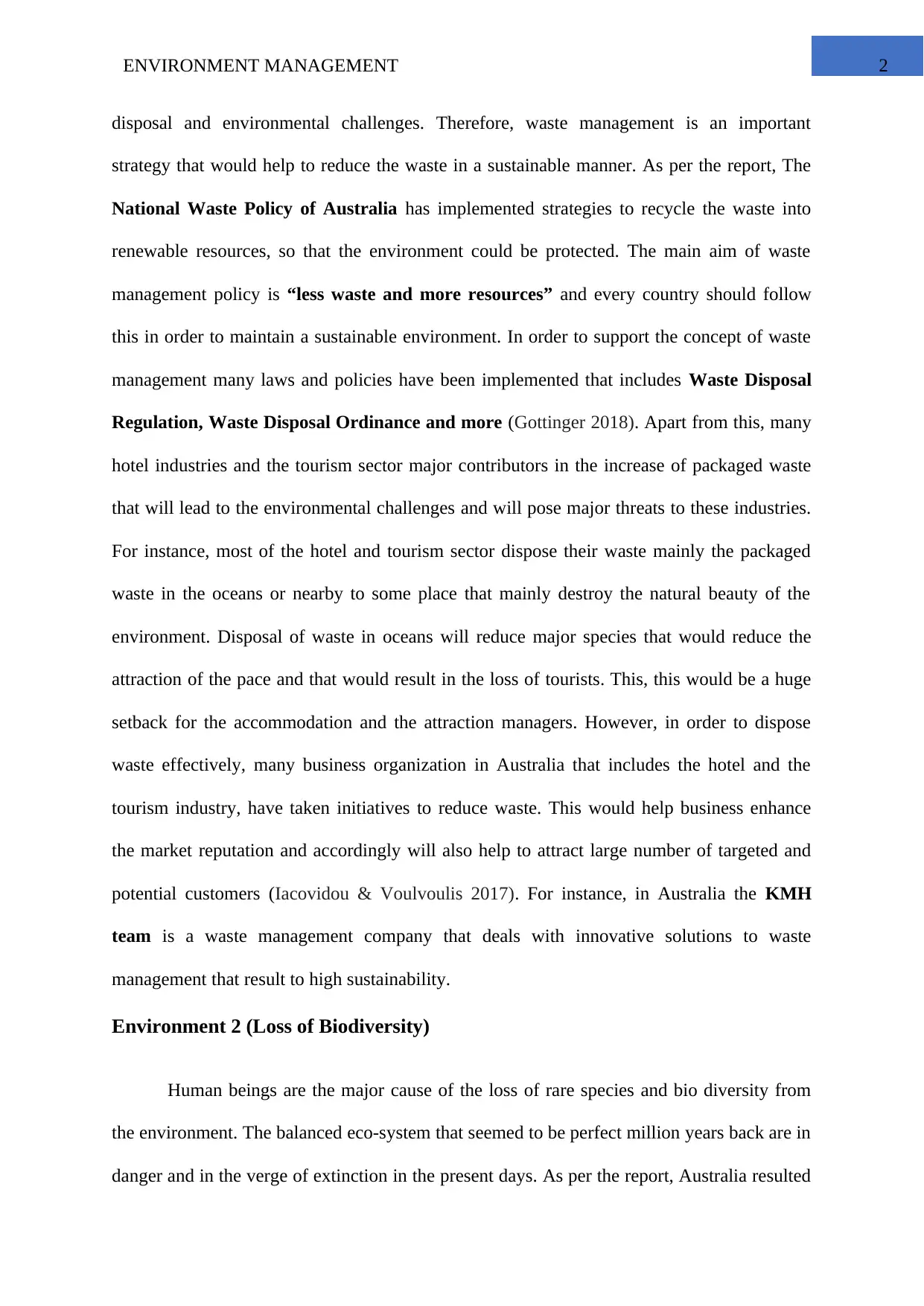
2ENVIRONMENT MANAGEMENT
disposal and environmental challenges. Therefore, waste management is an important
strategy that would help to reduce the waste in a sustainable manner. As per the report, The
National Waste Policy of Australia has implemented strategies to recycle the waste into
renewable resources, so that the environment could be protected. The main aim of waste
management policy is “less waste and more resources” and every country should follow
this in order to maintain a sustainable environment. In order to support the concept of waste
management many laws and policies have been implemented that includes Waste Disposal
Regulation, Waste Disposal Ordinance and more (Gottinger 2018). Apart from this, many
hotel industries and the tourism sector major contributors in the increase of packaged waste
that will lead to the environmental challenges and will pose major threats to these industries.
For instance, most of the hotel and tourism sector dispose their waste mainly the packaged
waste in the oceans or nearby to some place that mainly destroy the natural beauty of the
environment. Disposal of waste in oceans will reduce major species that would reduce the
attraction of the pace and that would result in the loss of tourists. This, this would be a huge
setback for the accommodation and the attraction managers. However, in order to dispose
waste effectively, many business organization in Australia that includes the hotel and the
tourism industry, have taken initiatives to reduce waste. This would help business enhance
the market reputation and accordingly will also help to attract large number of targeted and
potential customers (Iacovidou & Voulvoulis 2017). For instance, in Australia the KMH
team is a waste management company that deals with innovative solutions to waste
management that result to high sustainability.
Environment 2 (Loss of Biodiversity)
Human beings are the major cause of the loss of rare species and bio diversity from
the environment. The balanced eco-system that seemed to be perfect million years back are in
danger and in the verge of extinction in the present days. As per the report, Australia resulted
disposal and environmental challenges. Therefore, waste management is an important
strategy that would help to reduce the waste in a sustainable manner. As per the report, The
National Waste Policy of Australia has implemented strategies to recycle the waste into
renewable resources, so that the environment could be protected. The main aim of waste
management policy is “less waste and more resources” and every country should follow
this in order to maintain a sustainable environment. In order to support the concept of waste
management many laws and policies have been implemented that includes Waste Disposal
Regulation, Waste Disposal Ordinance and more (Gottinger 2018). Apart from this, many
hotel industries and the tourism sector major contributors in the increase of packaged waste
that will lead to the environmental challenges and will pose major threats to these industries.
For instance, most of the hotel and tourism sector dispose their waste mainly the packaged
waste in the oceans or nearby to some place that mainly destroy the natural beauty of the
environment. Disposal of waste in oceans will reduce major species that would reduce the
attraction of the pace and that would result in the loss of tourists. This, this would be a huge
setback for the accommodation and the attraction managers. However, in order to dispose
waste effectively, many business organization in Australia that includes the hotel and the
tourism industry, have taken initiatives to reduce waste. This would help business enhance
the market reputation and accordingly will also help to attract large number of targeted and
potential customers (Iacovidou & Voulvoulis 2017). For instance, in Australia the KMH
team is a waste management company that deals with innovative solutions to waste
management that result to high sustainability.
Environment 2 (Loss of Biodiversity)
Human beings are the major cause of the loss of rare species and bio diversity from
the environment. The balanced eco-system that seemed to be perfect million years back are in
danger and in the verge of extinction in the present days. As per the report, Australia resulted
⊘ This is a preview!⊘
Do you want full access?
Subscribe today to unlock all pages.

Trusted by 1+ million students worldwide
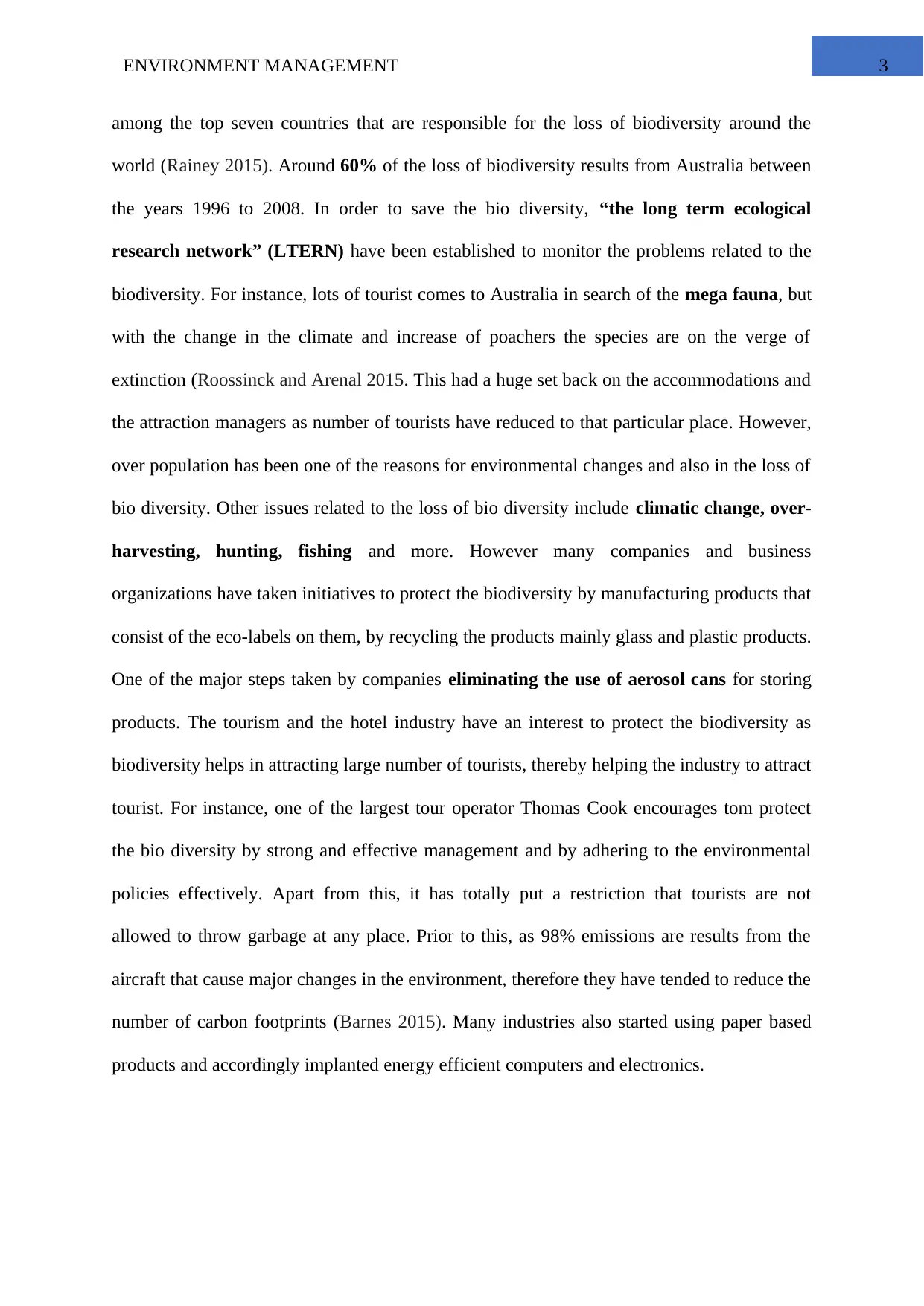
3ENVIRONMENT MANAGEMENT
among the top seven countries that are responsible for the loss of biodiversity around the
world (Rainey 2015). Around 60% of the loss of biodiversity results from Australia between
the years 1996 to 2008. In order to save the bio diversity, “the long term ecological
research network” (LTERN) have been established to monitor the problems related to the
biodiversity. For instance, lots of tourist comes to Australia in search of the mega fauna, but
with the change in the climate and increase of poachers the species are on the verge of
extinction (Roossinck and Arenal 2015. This had a huge set back on the accommodations and
the attraction managers as number of tourists have reduced to that particular place. However,
over population has been one of the reasons for environmental changes and also in the loss of
bio diversity. Other issues related to the loss of bio diversity include climatic change, over-
harvesting, hunting, fishing and more. However many companies and business
organizations have taken initiatives to protect the biodiversity by manufacturing products that
consist of the eco-labels on them, by recycling the products mainly glass and plastic products.
One of the major steps taken by companies eliminating the use of aerosol cans for storing
products. The tourism and the hotel industry have an interest to protect the biodiversity as
biodiversity helps in attracting large number of tourists, thereby helping the industry to attract
tourist. For instance, one of the largest tour operator Thomas Cook encourages tom protect
the bio diversity by strong and effective management and by adhering to the environmental
policies effectively. Apart from this, it has totally put a restriction that tourists are not
allowed to throw garbage at any place. Prior to this, as 98% emissions are results from the
aircraft that cause major changes in the environment, therefore they have tended to reduce the
number of carbon footprints (Barnes 2015). Many industries also started using paper based
products and accordingly implanted energy efficient computers and electronics.
among the top seven countries that are responsible for the loss of biodiversity around the
world (Rainey 2015). Around 60% of the loss of biodiversity results from Australia between
the years 1996 to 2008. In order to save the bio diversity, “the long term ecological
research network” (LTERN) have been established to monitor the problems related to the
biodiversity. For instance, lots of tourist comes to Australia in search of the mega fauna, but
with the change in the climate and increase of poachers the species are on the verge of
extinction (Roossinck and Arenal 2015. This had a huge set back on the accommodations and
the attraction managers as number of tourists have reduced to that particular place. However,
over population has been one of the reasons for environmental changes and also in the loss of
bio diversity. Other issues related to the loss of bio diversity include climatic change, over-
harvesting, hunting, fishing and more. However many companies and business
organizations have taken initiatives to protect the biodiversity by manufacturing products that
consist of the eco-labels on them, by recycling the products mainly glass and plastic products.
One of the major steps taken by companies eliminating the use of aerosol cans for storing
products. The tourism and the hotel industry have an interest to protect the biodiversity as
biodiversity helps in attracting large number of tourists, thereby helping the industry to attract
tourist. For instance, one of the largest tour operator Thomas Cook encourages tom protect
the bio diversity by strong and effective management and by adhering to the environmental
policies effectively. Apart from this, it has totally put a restriction that tourists are not
allowed to throw garbage at any place. Prior to this, as 98% emissions are results from the
aircraft that cause major changes in the environment, therefore they have tended to reduce the
number of carbon footprints (Barnes 2015). Many industries also started using paper based
products and accordingly implanted energy efficient computers and electronics.
Paraphrase This Document
Need a fresh take? Get an instant paraphrase of this document with our AI Paraphraser
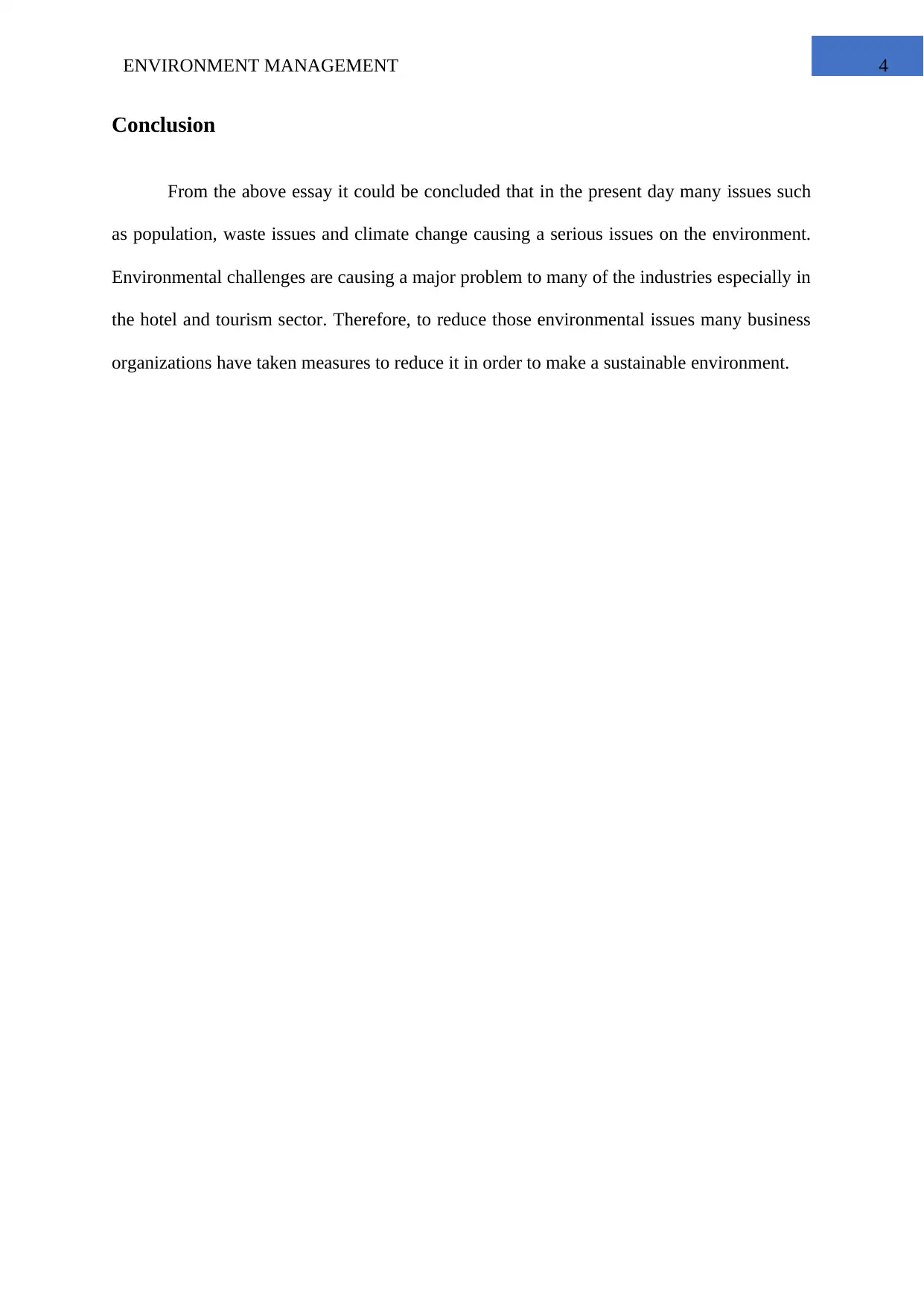
4ENVIRONMENT MANAGEMENT
Conclusion
From the above essay it could be concluded that in the present day many issues such
as population, waste issues and climate change causing a serious issues on the environment.
Environmental challenges are causing a major problem to many of the industries especially in
the hotel and tourism sector. Therefore, to reduce those environmental issues many business
organizations have taken measures to reduce it in order to make a sustainable environment.
Conclusion
From the above essay it could be concluded that in the present day many issues such
as population, waste issues and climate change causing a serious issues on the environment.
Environmental challenges are causing a major problem to many of the industries especially in
the hotel and tourism sector. Therefore, to reduce those environmental issues many business
organizations have taken measures to reduce it in order to make a sustainable environment.
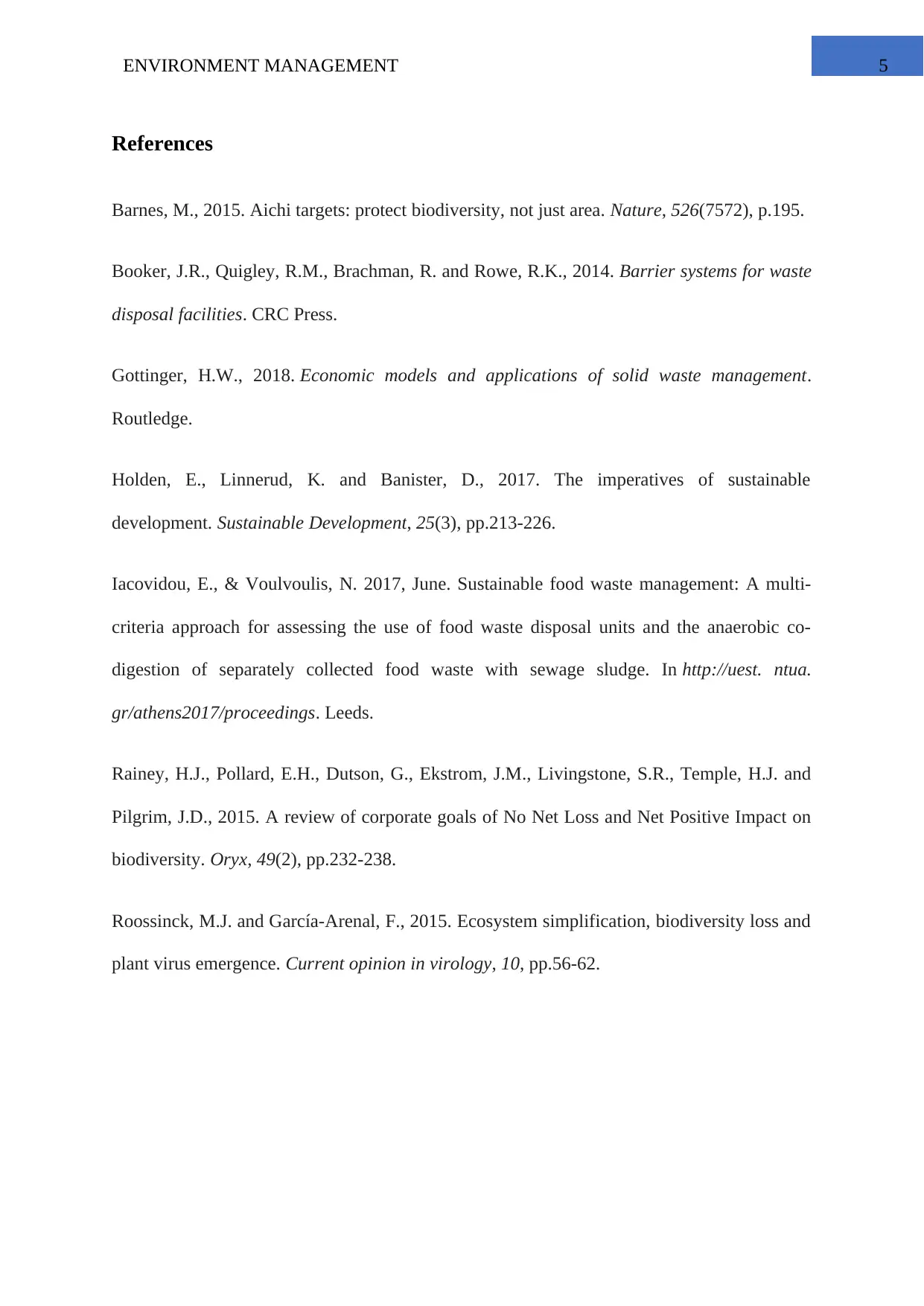
5ENVIRONMENT MANAGEMENT
References
Barnes, M., 2015. Aichi targets: protect biodiversity, not just area. Nature, 526(7572), p.195.
Booker, J.R., Quigley, R.M., Brachman, R. and Rowe, R.K., 2014. Barrier systems for waste
disposal facilities. CRC Press.
Gottinger, H.W., 2018. Economic models and applications of solid waste management.
Routledge.
Holden, E., Linnerud, K. and Banister, D., 2017. The imperatives of sustainable
development. Sustainable Development, 25(3), pp.213-226.
Iacovidou, E., & Voulvoulis, N. 2017, June. Sustainable food waste management: A multi-
criteria approach for assessing the use of food waste disposal units and the anaerobic co-
digestion of separately collected food waste with sewage sludge. In http://uest. ntua.
gr/athens2017/proceedings. Leeds.
Rainey, H.J., Pollard, E.H., Dutson, G., Ekstrom, J.M., Livingstone, S.R., Temple, H.J. and
Pilgrim, J.D., 2015. A review of corporate goals of No Net Loss and Net Positive Impact on
biodiversity. Oryx, 49(2), pp.232-238.
Roossinck, M.J. and García-Arenal, F., 2015. Ecosystem simplification, biodiversity loss and
plant virus emergence. Current opinion in virology, 10, pp.56-62.
References
Barnes, M., 2015. Aichi targets: protect biodiversity, not just area. Nature, 526(7572), p.195.
Booker, J.R., Quigley, R.M., Brachman, R. and Rowe, R.K., 2014. Barrier systems for waste
disposal facilities. CRC Press.
Gottinger, H.W., 2018. Economic models and applications of solid waste management.
Routledge.
Holden, E., Linnerud, K. and Banister, D., 2017. The imperatives of sustainable
development. Sustainable Development, 25(3), pp.213-226.
Iacovidou, E., & Voulvoulis, N. 2017, June. Sustainable food waste management: A multi-
criteria approach for assessing the use of food waste disposal units and the anaerobic co-
digestion of separately collected food waste with sewage sludge. In http://uest. ntua.
gr/athens2017/proceedings. Leeds.
Rainey, H.J., Pollard, E.H., Dutson, G., Ekstrom, J.M., Livingstone, S.R., Temple, H.J. and
Pilgrim, J.D., 2015. A review of corporate goals of No Net Loss and Net Positive Impact on
biodiversity. Oryx, 49(2), pp.232-238.
Roossinck, M.J. and García-Arenal, F., 2015. Ecosystem simplification, biodiversity loss and
plant virus emergence. Current opinion in virology, 10, pp.56-62.
⊘ This is a preview!⊘
Do you want full access?
Subscribe today to unlock all pages.

Trusted by 1+ million students worldwide
1 out of 6
Related Documents
Your All-in-One AI-Powered Toolkit for Academic Success.
+13062052269
info@desklib.com
Available 24*7 on WhatsApp / Email
![[object Object]](/_next/static/media/star-bottom.7253800d.svg)
Unlock your academic potential
Copyright © 2020–2026 A2Z Services. All Rights Reserved. Developed and managed by ZUCOL.



